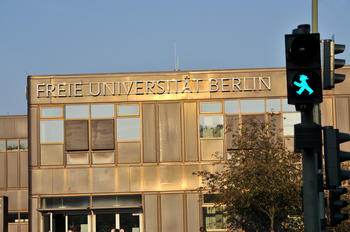Excellence Status Confirmed
Freie Universität Berlin has once again been successful in the Excellence Initiative jointly organized by the German federal government and the governments of the German states.
Dec 20, 2012
Freie Universität’s development strategy called “Veritas – Justitia – Libertas. International Network University” won special funding in the German national Excellence Initiative, as did three clusters of excellence and seven graduate schools.
Image Credit: Bernd Wannenmacher
Over the past ten years, Freie Universität has scored impressive successes in the development of research and in internationalization, successes that would not have been possible without thoughtful planning. Now, for the second time, the university has received confirmation that it has developed successful concepts for handling its future tasks. Freie Universität received recognition in the German government’s Excellence Initiative again this past June for its institutional strategy, termed the “concept for the future.”
We are happy that over the next five years, we will have the opportunity to put our strategy, “Veritas – Justitia – Libertas. The International Network University,” into practice. Freie Universität will receive about 120 million euros in all to translate its plans into reality – with a full third of the funding going toward the continuation of our development concept. What, specifically, should people expect to see?
The concept encompasses several areas of action. The principle of international networking will remain. We will maintain our seven liaison offices, located on five continents, and will increase our efforts aimed at bringing in junior scholars and scientists through those offices, from the doctoral study phase onward.
One new element of the strategy is the development of strategic partnerships, which we have started to develop with universities all over the world. These are universities that maintain strong research programs so that we can engage not only in exchange but also in joint efforts to support and promote junior scholars and scientists.
The internationalization of academia also entails living up to certain ethical responsibilities. With that in mind, Freie Universität is the first German higher education institution to join the “Scholars at Risk” network. This network, which was developed by individuals including cultural scholar Homi Bhabha – who holds an honorary doctorate from our university – supports outstanding scholars and scientists who face political repression in their home countries and are unable to perform research independently. From now on, with funding allocated under our future concept, these scholars will have the opportunity to work under optimum conditions at Freie Universität for a year and develop research projects.
One special feature of the new future concept is that it supports international and regional networking in equal measure. Together with research institutions not affiliated with the university – four Max Planck Institutes, two Helmholtz Centers, and the Wissenschaftszentrum, part of the Leibniz Association – Freie Universität is in the process, on its Dahlem campus, of implementing an overarching program aimed at supporting and promoting future scholars and scientists after their doctorates: the “career path model.” This initiative supports two-year postdoc projects, three-year junior research groups, and the establishment of fixed-term professorships.
Together with the aforementioned partners, we are creating tight-knit networks that promote secure academic careers and foster exchange between institutions. All junior scholars and scientists in this program are supposed to perform part of their research projects at partner universities abroad. The objective of the overall program is to provide greater security in career planning, which can only be achieved if universities and independent research institutions work together. Plus, of course, having a closer alliance with our partners will also benefit our teaching activities. Joint appointments and the increased engagement of young scholars and scientists from external institutions help to enhance supervisory and support relationships and increase the diversity of course and program offerings. We aim to prove the critics wrong – we will prove them wrong – by showing that excellence in research does not come at the expense of instruction, but quite the opposite: enhancing the quality of research means also enhancing the quality of teaching if if you develop thoughtful concepts that are aimed at close interaction between the two fields.
If we consider the most recent Funding Atlas published by the German Research Foundation (DFG), Freie Universität is one of Germany’s three strongest higher education institutions in terms of research activities. Compared with the other universities designated under the Excellence Initiative, Freie Universität has also done the most with the funding awarded to it in the initiative’s first round: Every euro in the Excellence Initiative budget was doubled through external fundraising.
In the humanities and social sciences, Freie Universität is far and away the top-ranked university in Germany, and the university also places in the absolute top of the field in the life and natural sciences. It is also a top destination internationally: No other higher education institution in the country is more attractive for international guest researchers than Freie Universität, and nowhere are there more recipients of DAAD and Humboldt fellowships at work.
In that regard, our success in the Excellence Initiative confirms that we have accomplished a great deal. The reputation and image of Freie Universität Berlin are more prominent and more positive than ever before.
Prof. Dr. Peter-André Alt (The author is the president of Freie Universität Berlin.)

